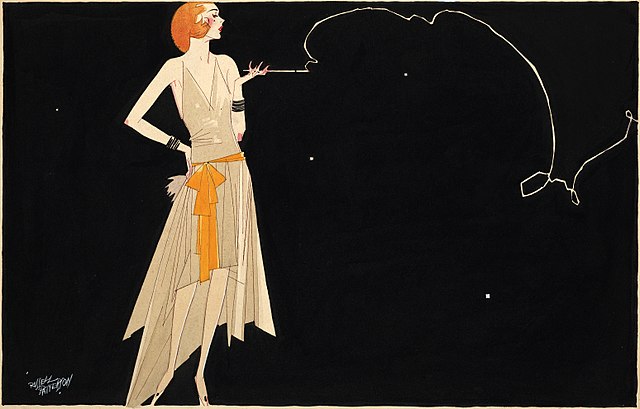
The Great Gatsby is a 1925 novel written by American author F. Scott Fitzgerald that follows a cast of rich unhappy young people living on Long Island in the summer of 1922.
The Thammasat University Library collection owns a number of editions of The Great Gatsby in the original English version and Thai translation, as well as other books by and about F. Scott Fitzgerald.
The novel explores themes of idealism, resistance to change, and social upheaval.
Although his books eventually won many admirers, Fitzgerald has a relatively short and sad life because he was an alcoholic, which ruined his health.
Thailand and The Great Gatsby
There has been considerable academic research in the Kingdom about The Great Gatsby and its author, F. Scott Fitzgerald.
One example is Ritthirong Konsri’s Need Fulfillment in F. Scott Fitzgerald’s Novel The Great Gatsby (2012), a master’s degree project in English at the Graduate School, Srinakharinwirot University in Bangkok.
In addition, The Lack of Moderation in The Great Gatsby: A Buddhist Perspective was presented in the Second International Conference on Language Literature and Cultural Studies (ICLLCS) at Burapha University by Siriwat Wongudomsin, a graduate student in the Master of Arts in English program at the Faculty of Arts, Srinakharinwirot University.
Khun Siriwat made the following observations:
This study aims to analyze the characteristics of Jay Gatsby, the main character in F. Scott Fitzgerald’s The Great Gatsby, from a Buddhist perspective. The researcher claims that the downfall of Gatsby arises from the lack of moderation, the concept that urges people to stay in the “Middle Path”, known as the “Noble Eightfold Path”. The Noble Eightfold Path is one of the Buddhist teachings that help guide men in living a happy life in the secular world. Introduction Many people struggle to fulfill their needs in numerous ways because they believe that wealth and material possessions are indicators of desire in success…According to Buddhism, living in moderation urges people to stay on the “Middle Path” which leads men to keep balance of life. One can see that the seven areas that Shaw mentions reflect the lack of moderation in people’s lives, and that writers always take it as a cause that leads to the destruction of the characters in novels. In F. Scott Fitzgerald’s The Great Gatsby, one of the greatest American novels, the story portrays the deterioration of Jay Gatsby, the main character, whose life is led by the belief that the desire to gain money and material possession would bring him success and fulfillment of life. Jay Gatsby, the main character of The Great Gatsby, represents one who follows the American Dream without a true understanding of it. Gatsby has a strong intent that material and financial wealth would lift his social status up to par with Daisy, the woman whom he is in love with. When he finds out that Daisy married Tom Buchanan, a wealthy old rich man, Gatsby still believes that it is because of wealth and social status. Gatsby believes that Daisy still loves him. This allows Gatsby to try by all means to be equal with Buchanan’s financial status so that he could fulfill his love with Daisy once again. Gatsby’s struggle to win Daisy heart is an example of those who distorted American Dream, and became a victim of extravagance. Gatsby involves himself with illegal business to raise his social status. He sees this as the only path to wealth since it brings him close to the goal faster. Gatsby shows to the society that he is rich by possessing material wealth such as a mansion, glamorous cars, and a lot of flamboyant parties. Gatsby does not enjoy his wealth, but he uses it as a tool to reach his goal. However, the financial and material wealth could not fulfill Gatsby’s goal that is Daisy, it, in return, destroys himself. To understand Gatsby’s decadence, which the researcher believes is partly caused by his lack of moderation; the concept of self-sufficiency or moderation is employed in this study. Self-sufficiency is one of the key concepts in Buddhist teachings. It suggests that people should not overly value the attachment towards material things (Loy 55). Loy also explains that material wealth brings secular happiness to men rather than psychological happiness. The secular happiness refers to happiness that is caused by material possession, while the psychological happiness means the happiness from within. According to Loy, the teaching of detachment advises the Buddhists to be satisfied with “minimum material needs” (55). The “minimum material needs” that Loy refers to is the four requisites instructed by the Lord Buddha to help guide laymen to live happily. Many studies about The Great Gatsby and its characters have been carried out from various aspects, but none of the studies demonstrate the lack of moderation as a cause that leads the main character to his downfall. Thus, it is in the interest of the researcher to analyze the characteristics of Jay Gatsby from a Buddhist perspective. In doing so, the researcher employs the concept of the “Noble Eightfold Path” as an empirical framework in the study.

Here are some thoughts by F. Scott Fitzgerald from books, most of which are in the TU Library collection:
Let me tell you about the very rich. They are different from you and me. They possess and enjoy early, and it does something to them, makes them soft, where we are hard, cynical where we are trustful, in a way that, unless you were born rich, it is very difficult to understand.
- The Rich Boy (1926)
There are no second acts in American lives.
- The Last Tycoon (1941)
No grand idea was ever born in a conference, but a lot of foolish ideas have died there.
- Notebook E: Epigrams, Wisecracks, and Jokes
You don’t write because you want to say something, you write because you have something to say.
- Notebook E: Epigrams, Wisecracks, and Jokes, edited by Edmund Wilson (1945)
All good writing is swimming under water and holding your breath.
- Undated letter to his daughter Scottie (Frances Scott Fitzgerald).
It takes a genius to whine appealingly.
- Letter to Maxwell Perkins, 1924
Isn’t Hollywood a dump — in the human sense of the word. A hideous town, pointed up by the insulting gardens of its rich, full of the human spirit at a new low of debasement.
- Letter to Alice Richardson (1940)
And here is an observation about F. Scott Fitzgerald by a fellow writer whose books are also in the TU Library collection:
[Fitzgerald] had one of the rarest qualities in all literature, and it’s a great shame that the word for it has been thoroughly debased by the cosmetic racketeers, so that one is almost ashamed to use it to describe a real distinction. Nevertheless, the word is charm — charm as Keats would have used it. Who has it today? It’s not a matter of pretty writing or clear style. It’s a kind of subdued magic, controlled and exquisite, the sort of thing you get from good string quartettes.
- Raymond Chandler in a letter to Dale Warren (1950)

(All images courtesy of Wikimedia Commons)
